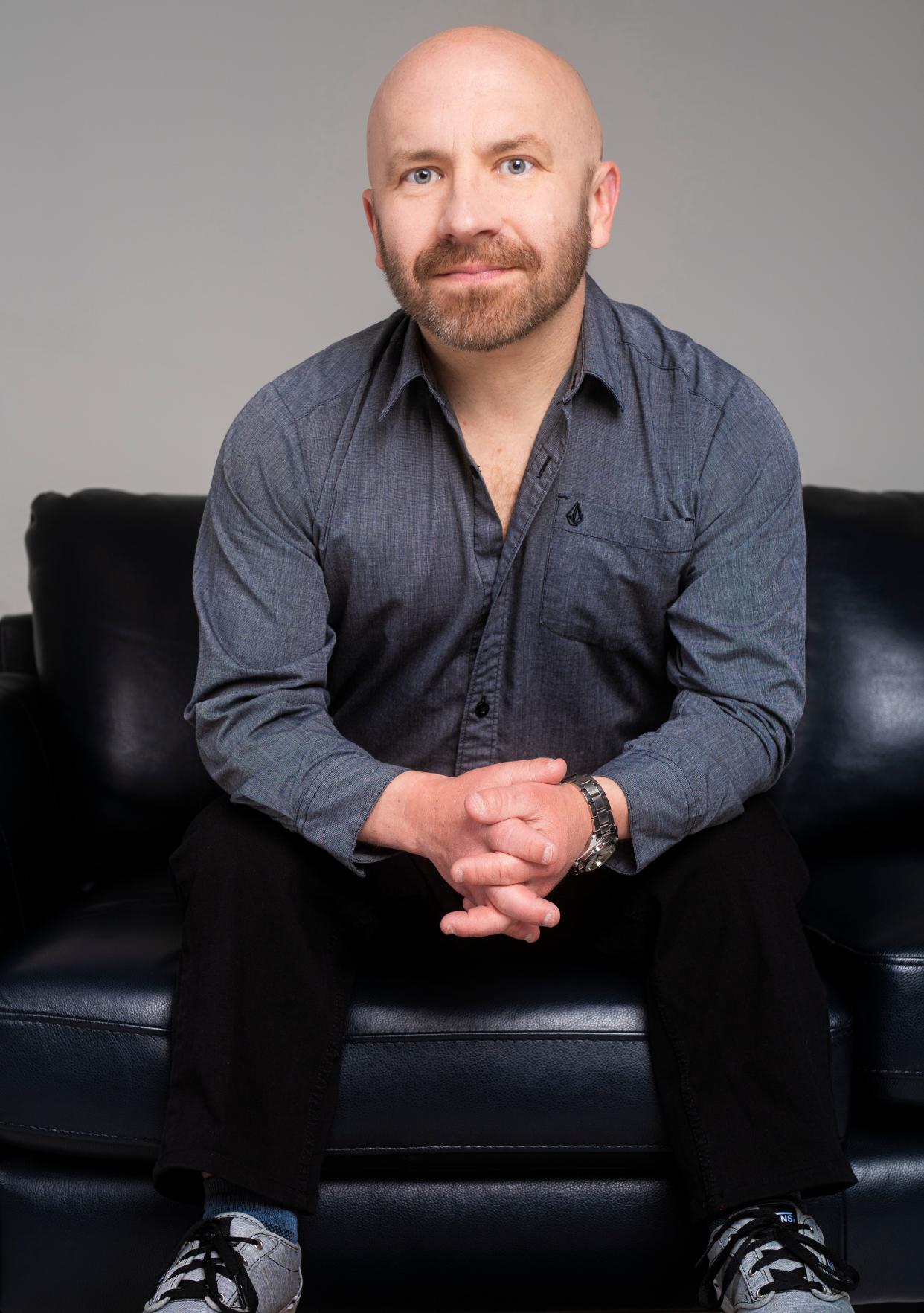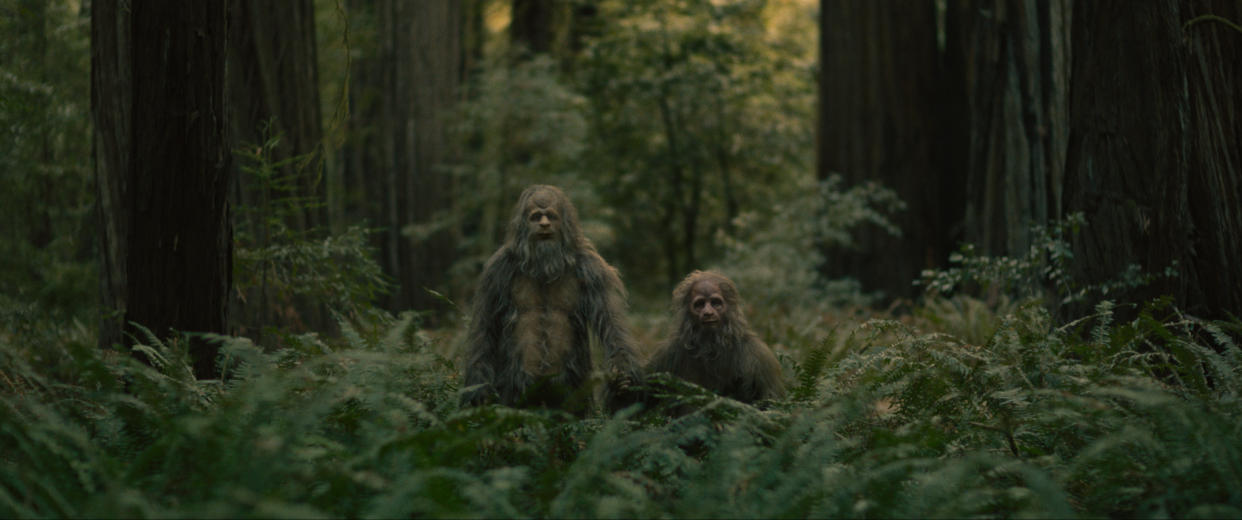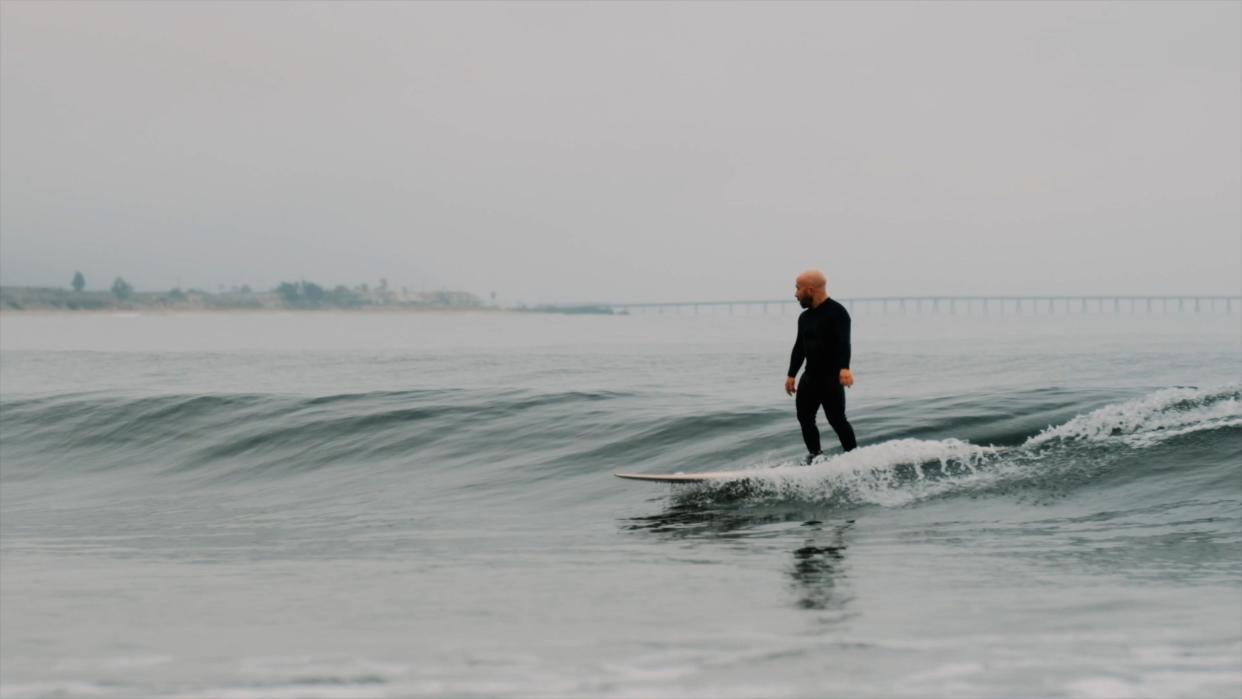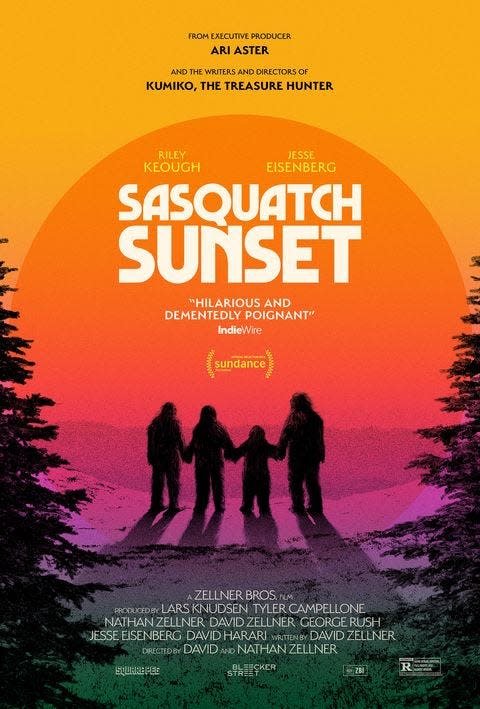Metro Detroit actor stars in 'Sasquatch Sunset' with Jesse Eisenberg and Riley Keough
"Life's a crazy ride," says Christophe Zajac-Denek, who is enjoying every moment of his current journey.
This weekend, he will be back in his hometown for Freep Film Festival screenings on Saturday and Sunday of the 10-minute documentary “Standing on Water.” It focuses on his experiences as someone born with a rare form of dwarfism and the confidence that he has gained from his passion for surfing.
Then on April 19, his new movie “Sasquatch Sunset” opens wide across the country. Starring Jesse Eisenberg, Riley Keough and Zajac-Denek, it could be described as a National Geographic special crossed with a slapstick, gross-out comedy.

Says the metro Detroiter now based in Los Angeles, "I wish this was what was happening every month.”
Zajac-Denek, who is 4-foot-4, grew up in Shelby Township and Almont, which is north of Romeo. For the last 15 years, he has been acting and doing stunt work in films and television. His credits include playing a drumming baby in the Andy Samberg comedy “Popstar: Never Stop Never Stopping” and a hitman in David Lynch’s series “Twin Peaks: The Return.”
In the Detroit music scene, he is best known for his stint in the 2000s as the drummer for the popular rock band the Hard Lessons.
Now Zajac-Denek is awaiting the reaction to "Sasquatch Sunset," his most high-profile project yet and what Variety calls “the kind of movie you need to see to believe.”
With that film gaining buzz and the Detroit screening of “Standing on Water” just days away, Zajac-Denek is enjoying each minute of the excitement.
“Sasquatch Sunset,” which was screened at this year’s Sundance Film Festival, was written and co-directed by David Zellner and co-directed by his brother, Nathan Zellner (who also plays an older Sasquatch). Their credits include the 2018 Western “Damsel,” starring Robert Pattinson, and "The Curse," Nathan Fielder’s cult hit Showtime series. Big fans of Bigfoot, the siblings had another movie at Sundance about mythic hairy creatures more than a decade ago, the 2011 short film “Sasquatch Birth Journal 2.”

With the detail of a nature documentary, "Sasquatch Sunset" depicts a year in the life of a Sasquatch family. There is no dialogue, just grunts, howls and surprisingly evocative facial expressions. Naked aside from their fur, the four Sasquatches roam the deep forest together foraging for food, grooming one another, making shelters with leaves and branches and performing all of the various bodily functions that humans save for behind closed doors.
But there are tender and tragic parts, too, as the Sasquatches deal with fear, danger and death and face the encroachment of civilization — roads, machines, a stray campsite — on the unspoiled wilderness. Talking about why she did the movie, Keough told the New York Times, "I thought it was beautiful and hilarious and absurd and touching and crazy, all the things I love in a movie."
The movie was filmed in 2022 in an area of northern California that's familiar with supposed Bigfoot sightings. Prior to that, Zajac-Denek says, he watched videos of apes in motion sent by the Zellners. “That was really informative to me because we all know how to move like humans, and Sasquatch kind of walks that line between ape and human,” he says.
During a week of rehearsal, cast members trained with a movement coach, Lorin Eric Salm, a former student of iconic mime Marcel Marceau. Inside an office building, they practiced things like carrying around rocks and sticks, grooming one another, and eating arugula and smoked salmon.
“The office just got destroyed by these four Sasquatches,” says Zajac-Denek. “David and Nathan were perfect to set this up for us. If I would have just shown up on set without having that rehearsal, I don’t think I would have been in the right mental space that they wanted.”
As the smallest Sasquatch who appears to be the son of Keough’s character, Zajac-Denek had to convey the mood and behavior of a youngster who, in his mind, was somewhere between 6 and 8 years old, “needy and curious and maybe a little dim-witted and still wanting to be around some sort of nurturer, but also trying to find his own way.”
Throughout the monthlong shoot, it took several hours each day to turn the actors into their characters through prosthetic makeup and body suits. “Once you got into the costume, it was transformative. I can’t be the same person when somebody works on me for two hours and turns my face into a Sasquatch,” says Zajac-Denek.
And then there was the technical process of those scenes involving throwing up, urinating, defecating and so on. For the sequence where the Sasquatches become agitated after discovering a paved road, for instance, Zajac-Denek says the crew had to set up the necessary equipment for the characters to mark the territory “We had our freak-outs, and we were going crazy. But then we also had to pause so they could put a pee tube down our suit and then test the correct pressure of the pee, so it wasn’t sputtering or rocketing out."
Another device, which he calls a “massive poop contraption,” was covered in blue tape so it could be removed from the final version. He describes being instructed exactly where to squat he could look realistic, but also hide as much of the device as possible.
“We all were on board. We all wanted these Sasquatch to be real, not dancy or performative. We wanted them to be as real as possible. I think that makes the moments that are so absurd even funnier because we are taking it so seriously,” he says. When the cameras stopped rolling on such scenes, “my face hurt so much, just from laughing.”
When he's not working on a set, Zajac-Denek is an activist for people born with dwarfism. “I’ve had to deal with and work through a lot of self-confidence issues and even self-denial, self-hatred," he says of his own struggles. In 2019, he launched a podcast called "I'm Kind of a Big Deal" that tells "HUGE STORIES about little people," as the show's Instagram account puts it. He says he is now able to “embrace my people and myself more than I ever have.”

The documentary “Standing on Water” by filmmaker Tommy Corey is a meditation on Zajac-Denek’s lifelong love of surfing, which goes back to when he was 14 and his mother took him to Florida so he could rent a surfboard and try it himself, and the deeper meaning of the sport to him. “Being a little person from Detroit, I never ever thought I would be the subject of a surf film,” he says. He hopes the takeaway from “Standing on Water” will be: “Don’t judge a book by its cover and acceptance goes a very long way.”
The self-assurance that surfing has brought Zajac-Denek is among the things that helped him take on a role as demanding and extensive as his character in “Sasquatch Sunset.” Although he was nervous at first about being on-screen for the bulk of the film with Eisenberg, an Oscar nominee for "The Social Network," and Keough, an Emmy nominee for "Daisy Jones & the Six," he says they and the Zellners have “all been so welcoming, so awesome, so collaborative.”
Zajac-Denek hopes the word gets out that the R-rated film is more than just an absurd comedy. “You feel connected to these Sasquatch characters 10 minutes in,” he says, adding that the narrative is a “very strong commentary about the connection to nature, the connection to animals, the connection to the higher powers, and how we as humans are exploiting nature and relying on technology.”
He adds: “I’ve seen the film six times now, and I get new stuff out of it every time. … The more you watch it, I think, the more poignant it becomes.”
Contact Free Press pop culture critic Julie Hinds at jhinds@freepress.com.

'Sasquatch Sunset'
Opens April 19 in metro Detroit
Rated R; sexual content, nudity, bloody images
1 hour, 29 minutes
'Standing on Water'
Short film about Christophe Zajac-Denek is part of the Freep Film Festival's "Shorts Program #2: Life and Actuality" short documentary program.
8 p.m. Sat. at Birmingham 8 Powered by Emagine, 7 p.m. Sun. at the Michigan Science Center (IMAX) in Detroit.
Tickets are $15 and can be purchased at the Freep Film Festival website. "Standing on Water" and the program's other short documentaries also are available virtually.
This article originally appeared on Detroit Free Press: 'Sasquatch Sunset' movie stars metro Detroit's Christophe Zajac-Denek
